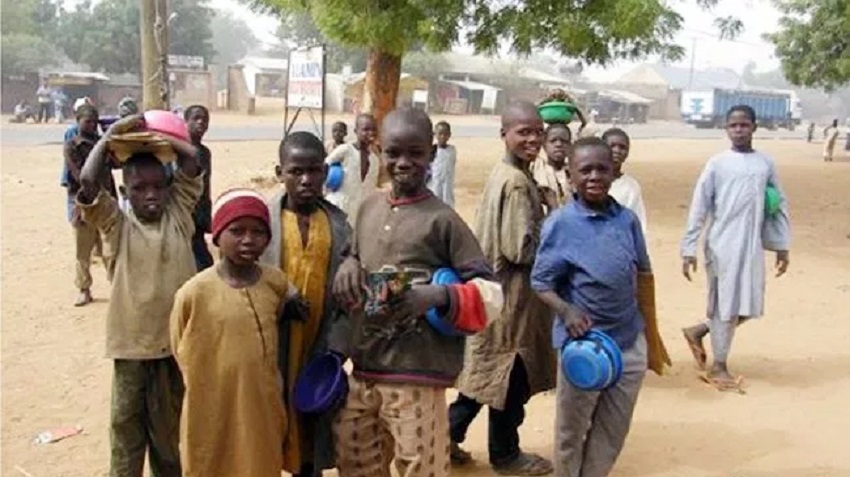Education
Tackling Nigeria’s Out-of-School Children Menace

By Jerome-Mario Utomi
As both the federal and state governments in Nigeria continue to allow the rate of out-of-school children, especially in the northern part of Nigeria, to swell in number, even when it is obvious that the streets are known for breeding all forms of criminals and other social misfits who constitute the real threat in the forms of armed robbers; thugs, drunkards, prostitutes and all other social ills that give a bad name to the society, Nigerians are beginning to view government’s approach to the challenge as not yielding the targeted result.
The latest of such worry came from Kogi State Commissioner for Education, Science and Technology, Wemi Jones, who recently during a 2-day North-Central Zonal Meeting on Draft Medium-Term National Development Plan (MTNDP), held in Lokoja, called on stakeholders in the sector to find a lasting solution to the problem.
While lamenting that out of the 17 states in the country with the highest number of out-of-school children, 14 of the states are in the north, Jones said if the rate of out-of-school children can be curtailed, it would help check the insecurity that is currently bedevilling parts of the country, and would to a large extend signal goodbye to insecurity threats across the country.
Though he said it in a different way, venue and time, in the real sense of it, Mr Commissioner may not have said something new or different from what Nigerians have been worried about all these years.
To prove how successive administrations in the country have done very little in arresting the situation, a particular report in 2013, described as mind-numbing the awareness that about 10.5 million Nigerian children of school age are not enrolled in schools. Out of this number, the report explained that about 9 million are children of beggars, fishermen and other less privileged people in the society.
Again, in 2018, a UNICEF survey showed that the population of out-of-school children in Nigeria had risen from 10.5 million to 13.2 million, the highest in the world.
The UNICEF survey says something else; there is still a huge number of those who are in school but are learning nothing, noting that schooling does not always lead to learning. In Nigeria, there are more non-learners in school than out of school, it concluded.
Indeed, going by the facts below, UNICEF in my views may not be wrong in its postulation.
With the nation’s current population of over 195.9 million, 45 per cent of which are below 15 years, there is a huge demand for learning opportunities translating into increased enrolment. This has created challenges in ensuring quality education since resources are spread more thinly, resulting in more than 100 pupils for one teacher as against the UNESCO benchmark of 35 students per teacher and culminating in students learning under trees for lack of classrooms.
Basically, there exist in my opinion about three major troubling realities that characterize the situation as a crisis.
First is the awareness that Nigeria is not in short supply of policy measures and laws to ensure that no child is left behind in education. Yet, the number keeps swelling each year.
As argued elsewhere, there is free and compulsory primary and junior secondary education to cater for children aged five to 14 years.
To explain this point, the Universal Basic Education Act 2004 is the legal framework that provides for compulsory, free and universal basic education of all children of primary and junior secondary school age in the country. There is also the Child Rights Act, which reinforces this as a basic human right by prescribing schooling up to junior secondary school.
UBEC intervention funds, as we know, are focused on collaboration with other state actors towards improving access to basic education and reducing Nigeria’s out-of-school children.
The budgetary allocation for education for example in 2020 is N671.07 billion constituting 6.7 per cent. Of the N671.07 billion allocated to the Federal Ministry of Education, the sum includes the statutory transfer allocated to the Universal Basic Education Commission (UBEC), which is N111.79 billion. Yet, most of the states cannot draw from this fund as a result of their (states) inability to provide the counterpart funding.
So what benefits is the fund?
It was such encumbrance I presume that recently prompted the Ekiti State Governor, Dr Kayode Fayemi, to call on the federal government to remove counterpart funding as part of basic requirements for states to access the federal government funding of UBEC.
The second factor fuelling the out-of-school challenge in Nigeria stems from the awareness that despite the universal declaration of education as a fundamental human right for everyone and this right was further detailed in the convention against discrimination in education, Nigerian governments, particularly the northern governors, failed to turn more of their energies in, or focus their creativity on the useful things that will translate to the empowerment of the people.
They made policies that view education as very narrow and restricted.
Presently, what the region and Nigeria by extension need is a restless determination to make the idle of governance a reality.
At this critical point of our nationhood, the northern governors must do this work-and in doing the work, stimulate their people particularly the youths to learn and acquire higher levels of skills and techniques for economic independence.
There are certain technical steps that must be taken.
First, it is time to recognize that any region desirous of securing the future of its people must invest in education. This is more urgent in the north where it is agreed that historical underdevelopment in Western education is responsible, more than the diversity in religious loyalties, for the social imbalance between the region and the south.
Similarly, the hour has come for the governors from the region to adopt and support the 2030 sustainable agenda- a United Nation initiative and successor programme to the Millennium Development Goals (MDGs)- with a collection of 17 global goals formulated among other aims to promote and cater for people, peace, planet, and poverty.
And has at its centre; partnership and collaboration, ecosystem thinking, co-creation and alignment of various intervention efforts by the public and private sectors and civil society.
The reason for this assertion is barefaced.
A few years ago, it was reported that Mathew Hassan Kukah- a well-informed, self-contained and quietly influential Bishop of the Catholic Diocese of Sokoto had during a four-day workshop tagged Interfaith Dialogue and Engagement for Christians and Muslims in Minna, Niger State that the Kukah Centre (TKC), promised to introduce skill acquisition centres in the northern part of the country where about 10 million Almajiri children will acquire vocations of their choice.
For sure, with the slow economic but high population growth in Nigeria particularly in the north, such a programme would have been an effective tool for fighting unemployment and consolidating economic growth. But for yet to be identified reason(s), no governor from the north bought into that opening provided or encouraged their youth to access such opportunity.
Regardless of what others may say, it is in the interest of the government to educate its people on different skills that create jobs for the youths as a formidable way of curbing crime and reducing threatening insecurity in the country.
It should be done not merely for political consideration but from the views of national development and sustenance of our democracy and the best place to start from should be a deliberate effort to drastically reduce the number of our school children.
When this is achieved, it will in turn bring about sustained peace; result in improved hygiene and medical care, greater educational opportunities. State governments are hereby enjoined by this piece to embark on aggressive education of their people, ensuring its compulsion to a certain level.
To catalyse this process, a shift in action is important as ‘we cannot solve our socio-economic challenges with the same thinking we used when we created it.
The governors need to bring a change in the leadership paradigm by switching over to a leadership style that is capable of making successful decisions built on a higher quality of information.
Jerome-Mario Utomi is the Programme Coordinator (Media and Policy), Social and Economic Justice Advocacy (SEJA), Lagos. He could be reached via jeromeutomi@yahoo.com/08032725374.
Education
No School, Still Learning: How GOtv is Helping Parents Win the Holiday Season

Let’s be real: holidays are a vibe for kids. No early mornings. No homework. Just endless episodes of their favorite shows, and somehow, they still find the same joke funny after the tenth replay.
But for parents, it’s a different game. You’re trying to let the kids have their fun, and secretly wondering if they’ll forget everything they were taught in school before back to school season rolls in.
GOtv gets it. And that’s why they’ve created the perfect win-win: a holiday lineup packed with shows that are just as educational as they are entertaining. Now kids can enjoy screen time that actually teaches without feeling like they are stuck in a classroom.
Here are some shows on GOtv that are bringing the right blend of fun and learning this holiday season:
1. Cowbellpedia (Africa Magic Family, GOtv Channel 2)

Cowbellpedia is a quiz competition that tests students in subjects like mathematics and general knowledge. Beyond boosting academic skills, it helps kids improve their confidence, think critically, and build resilience. It is competitive, exciting, and a great way to show that learning can actually be fun.
2. The Loud House (Nickelodeon, GOtv Channel 60)

Living in a house with ten sisters is no joke, and Lincoln Loud is proof. The Loud House takes kids through the ups and downs of growing up in a big family. With every episode, children learn how to handle disagreements, share space, communicate better, and build stronger relationships with siblings and friends. It is like a crash course in real life, but with more laughs.
3. PAW Patrol (Nick Jr., GOtv Channel 61)

PAW Patrol is perfect for younger kids who love action and adventure. Ryder and his team of rescue pups go around saving the day in Adventure Bay. Each pup has a unique skill, and together, they teach kids the value of teamwork, helping others, solving problems, and staying calm during emergencies. It is a fun way to teach big lessons through little heroes.
4. Coop and Cami Ask the World (Disney Channel, GOtv Channel 57)

Coop and Cami are the kind of siblings who turn everything into an online poll. Instead of guessing, they ask their fans what to do next and make decisions based on the responses. Kids watching get to laugh along while learning about making smart choices, thinking through decisions, being responsible, and understanding how their actions affect others. It is all fun and games, but with meaningful takeaways.
5. Craig of the Creek (Cartoon Network, GOtv Channel 67)

Craig and his friends are always off on new adventures in their neighborhood creek. But behind all the exploring and creativity, kids are picking up serious life skills. The show encourages problem-solving, teamwork, leadership, and how to be resourceful. It celebrates imagination and reminds kids that learning does not only happen in classrooms.
With GOtv, the holiday season is looking brighter for kids and less stressful for parents. Renew your GOtv subscription or upgrade your package today via the MyGOtv App or dial *288#. And if you are always on the move, download the GOtv Stream App so your kids can keep learning and having fun no matter where they are.
Education
Firm Unveils New Educational Game AfriTrivia in Lagos for African Children

By Aduragbemi Omiyale
An organisation known as Jesin Games on Monday, April 7, 2025, launched a new educational game, AfriTrivia, in Lagos.
The trivial game was designed to promote facts about the African continent, improve awareness about Africa, even among Africans themselves, and to better connect the African Diaspora from all over the world to their continent of origin, according to the chairman advisory board of Jesin Games, Professor Soji Adelaja.
It was stated that AfriTrivia would amuse and challenge everyone with a host of intriguing questions for beginners and experts.
The game will also be launched in Marrakech at the African Heritage Concert and Award Ceremony this weekend, while that of United States launch will come up in few weeks to come.
“Many Africans know little or nothing about the rest of their continent, and many people in the diaspora have little opportunity to learn what they lack about their continent because they are left relying on books written by historians or other means of learning not presented by Africans,” Mr Adelaja stated.
He described AfriTrivia as more than just a trivia game but an educational tool that can be used to “discover all the cultural and historical diversity in Africa through different topics.”
The chief executive of Jesin Games, Mr John Esin, on his part, said, “AfriTrivia is a game that challenges you to test your knowledge on some of the most interesting categories like Quotations, History, Sports and Entertainment, Arts and Culture, Government and Politics, and People and Places about some of the historical sites such as the Rock-Hewn Churches of Lalibela, to The Great Pyramids of Giza.
“It is meant for families to play together, friends to play with each other, and classrooms to become “creative centres of learning about our world.”
A former Governor of Cross Rivers State, Mr Donald Duke, while speaking at the unveiling of the product, praised the organisation for the initiative.
“AfriTrivia Jesin Games will fill the void of lack of knowledge about the African continent,” the former presidential candidate remarked, urging the developer to make it available for schools in Nigeria so that they can know more about Africa.
Education
Entries for 2025 MTN Foundation Scholarship Programme Open

By Aduragbemi Omiyale
Nigerian students interested in getting funds for their tertiary education can now apply for the scholarship programme of MTN Foundation.
In the past 15 years, MTN Foundation has awarded 14,728 scholarships worth over N3 billion to students as part of its ongoing investment in education.
The scholars have been given platforms to acquire relevant skills and practical knowledge to thrive in today’s evolving job market.
This gesture has been done by the organisation to encourage excellence in academic pursuit, deepen diversity and inclusion by empowering blind students in Nigeria.
The main objective is to strengthen the development of Science, Technology, Engineering, and Mathematics (STEM) in the country.
The scholarship is in three categories, the Science and Technology Scholarship (MTN STS), which is for all 300-level Science and Technology students with a minimum Cumulative Grade Point Average (CGPA) of 3.5 (Second Class Upper or its equivalent); the MTN Scholarship for Blind Students (MTN SBS), which caters to the educational needs of blind students in 200-level with a minimum CGPA of 2.5 or its equivalent; and the Top 10 UTME scholarship for top 10 scoring candidates of the UTME, as announced by JAMB.
The application process is straightforward and conducted online, making it accessible for students nationwide. Eligible candidates are encouraged to visit mtn.ng/scholarships/ and apply before the application deadline on April 25, 2025.
Awardees are given N300,000 annually for three years until graduation, provided they maintain the minimum grade point requirement.
“Education is the backbone of national development, and at MTN Foundation, we are committed to ensuring that no bright mind is left behind due to financial constraints.
“This scholarship is not just about funding education; it is about investing in Nigeria’s future leaders, innovators, and problem-solvers,” an Executive Director of the MTN Foundation, Odunayo Sanya, stated.
-

 Feature/OPED5 years ago
Feature/OPED5 years agoDavos was Different this year
-
Travel/Tourism9 years ago
Lagos Seals Western Lodge Hotel In Ikorodu
-

 Showbiz2 years ago
Showbiz2 years agoEstranged Lover Releases Videos of Empress Njamah Bathing
-

 Banking7 years ago
Banking7 years agoSort Codes of GTBank Branches in Nigeria
-

 Economy2 years ago
Economy2 years agoSubsidy Removal: CNG at N130 Per Litre Cheaper Than Petrol—IPMAN
-

 Banking2 years ago
Banking2 years agoFirst Bank Announces Planned Downtime
-

 Sports2 years ago
Sports2 years agoHighest Paid Nigerian Footballer – How Much Do Nigerian Footballers Earn
-

 Technology4 years ago
Technology4 years agoHow To Link Your MTN, Airtel, Glo, 9mobile Lines to NIN















